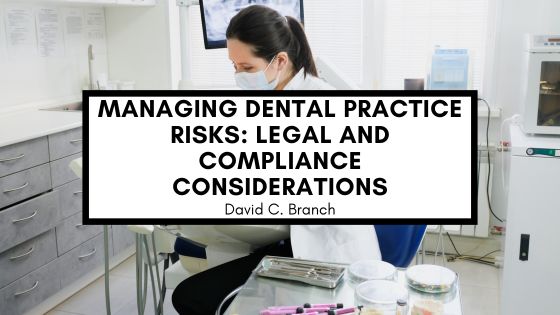Running a dental practice comes with numerous challenges, and navigating the legal and compliance landscape is crucial for success and longevity. This article explores the key aspects of managing risks in dental practices, shedding light on legal obligations, compliance issues, and proactive measures practitioners can take to ensure a smooth operation.
Operating a dental practice involves not only providing quality care to patients but also understanding and mitigating potential risks. From legal obligations to compliance standards, managing these aspects is paramount to the success and reputation of any dental practice.
- Legal Foundations for Dental Practices: Delving into the legal framework that governs dental practices, including licensing requirements, malpractice considerations, and contractual obligations. Understanding these foundations is essential for practitioners to establish a solid legal footing.
- Patient Privacy and HIPAA Compliance: Highlighting the significance of patient privacy and the legal obligations under the Health Insurance Portability and Accountability Act (HIPAA). Exploring how dental practices can safeguard patient information, implement HIPAA-compliant processes, and avoid legal ramifications.
- Employment Law in Dental Practices: Navigating the complexities of employment law within dental practices, covering areas such as hiring practices, employment contracts, and workplace policies. Ensuring compliance with labor laws is crucial for maintaining a harmonious work environment.
- Infection Control and OSHA Compliance: Addressing the importance of infection control in dental settings and the associated Occupational Safety and Health Administration (OSHA) compliance requirements. Exploring protocols to minimize infection risks and the legal implications of non-compliance.
- Malpractice Prevention and Risk Management: Providing insights into strategies for preventing malpractice incidents, including effective communication with patients, maintaining accurate records, and continuous professional development. Understanding these risk management principles is vital for protecting both practitioners and patients.
- Dental Board Regulations and Professional Conduct: Examining the role of dental boards in regulating the profession and enforcing ethical standards. Discussing the implications of professional misconduct and how adherence to ethical guidelines can safeguard a practitioner’s reputation.
- Insurance Considerations for Dental Practices: Navigating the various insurance options available to dental practices, from malpractice insurance to general liability coverage. Understanding the scope of insurance policies and ensuring adequate coverage is essential for risk mitigation.
- Responding to Legal Challenges: Providing guidance on how dental practices can effectively respond to legal challenges, including malpractice claims or regulatory investigations. Highlighting the importance of legal counsel and proactive measures in resolving issues swiftly.
- Emerging Technologies and Data Security: Exploring the impact of emerging technologies on dental practices and the associated data security concerns. Discussing strategies to adopt new technologies while maintaining compliance with data protection regulations.
- Continuous Compliance Education: Stressing the importance of ongoing education for dental practitioners and staff to stay abreast of evolving legal and compliance requirements. Emphasizing the role of professional development in risk management.
Summarizing the critical legal and compliance considerations in managing dental practice risks. Encouraging practitioners to proactively address these issues to ensure the long-term success and sustainability of their practices.

